Genealogy
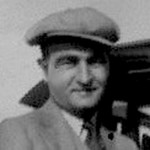 My Great Uncle John Clark Spare, who was my Great Aunt Mina Schumacher’s husband, had a lengthy career in the Army, that began when he enlisted in the North Dakota National Guard on June 30, 1916 at the tender young age of 17 years. At that time he was assigned to the Rio Grande River Border Patrol along the United States-Mexican Border, at Mercedes, Texas. In all, he served off and on from 1916 to 1943. When he wasn’t off fighting in wars, he was able to receive training in the Highway Engineering branch of Civil Engineering at Iowa State College. Following his education, he was assigned to field work, which is where I believe he began his initial association with the Indian tribes in the area, and would eventually change his life forever.
My Great Uncle John Clark Spare, who was my Great Aunt Mina Schumacher’s husband, had a lengthy career in the Army, that began when he enlisted in the North Dakota National Guard on June 30, 1916 at the tender young age of 17 years. At that time he was assigned to the Rio Grande River Border Patrol along the United States-Mexican Border, at Mercedes, Texas. In all, he served off and on from 1916 to 1943. When he wasn’t off fighting in wars, he was able to receive training in the Highway Engineering branch of Civil Engineering at Iowa State College. Following his education, he was assigned to field work, which is where I believe he began his initial association with the Indian tribes in the area, and would eventually change his life forever.
However that may have happened, John did end up being considered a person the tribes would listen to, and because of that, he was invited on November 11, 1936 to the Standing Rock Indian Reservation near Cannonball to give a speech at the American Legion Post Rally. Later that day, an Indian named White Eagle told him that an old Indian named Walking Cloud liked his speech very much and wanted to meet him. As it turned out, Walking Cloud had recently lost his son. He wanted to adopt John in his place…quite an honor. Over the remainder of that year and into the next, Walking Cloud and his wife, Mary visited the Spare home frequently. I would guess that they were getting to know each other better.
The ceremony was set for July 4, 1937 at Cannonball, during the first celebration of the Sundance since it was abolished in 1892 because the government felt the ritual was too torturous. For those who don’t know, the ritual entailed raising a huge pole with leather thongs tied to the top…two for each dancer. Incisions were made in two places on the braves chests and the ends of the thongs knotted into them. The dancers then danced around the pole until the thongs ripped from their chest, as a way of displaying their bravery. The Sundance was able to be revived in 1937, because most of the older Indians had died, and the younger ones weren’t very interested in having the torturous dance kept as part of the ceremony after all 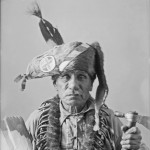 that time.
that time.
John Clark Spare was made Walking Cloud’s son during that ceremony, and given a Chief’s headdress made with genuine eagle feathers, which would be impossible now. Attached to the headdress was a long trailer of brilliant feathers running from the base of the neck to the ground. Trailers were worn by chiefs only on special occasions, Mina had fashioned breeches and a coat of pure white leather for him. Her work was exquisite, especially the bead work that covered most of the garment. After his adoption, John studied Indian lore more than before, and the collecting of Indian artifacts became his beloved hobby.
 My Grand Nephew, Easton Moore, who is the youngest son of my niece Machelle and her husband, Steve, is having his tenth birthday today. Turning ten, is a big deal to Easton, as it is with most kids. He is leaving the little kid days of a single digit age behind, and moving on into the much more grown up days of double digit ages. Nothing could be more important to a guy than that!! After all, it is the beginning of so many new phases in his life…right??
My Grand Nephew, Easton Moore, who is the youngest son of my niece Machelle and her husband, Steve, is having his tenth birthday today. Turning ten, is a big deal to Easton, as it is with most kids. He is leaving the little kid days of a single digit age behind, and moving on into the much more grown up days of double digit ages. Nothing could be more important to a guy than that!! After all, it is the beginning of so many new phases in his life…right??
Well, it is…but those new phases can seem a little bit daunting too. Many kids at this age, think it’s babyish to say things like, “I love you Mom!” For Easton, that could be a problem, because one of his favorite things is to sit on his mom’s lap when she sits down to watch television, and then tell her that he loves her about every 5 minutes. I hope that is something that Easton never allows to bother him. My grandson, Caalab is like that, and even though he is going to be 17 this summer, he still gives me a  hug and tells me he loves me…and he is very macho, so don’t worry about that, Easton, ok.
hug and tells me he loves me…and he is very macho, so don’t worry about that, Easton, ok.
Easton is not sure he likes having his own room either, and he can often be found sleeping on the floor in his brother’s room. Again, that is not too unusual at this age, especially since he and his brother shared a room until recently. That is a problem he shares with his Aunt Susie, and seems to happen when the younger child finally gets their own room. The older one shared until they were old enough not to be bothered by that aloneness. Time will cure that little problem.
One thing Easton definitely doesn’t miss is being in the back seat of the car. He is now big enough to no longer require a booster seat, so he finally gets to ride up front with his mom…and now she is the one who finds that odd. I’m sure that Easton loves being closer to the radio, so he can turn it up when his favorite song, “Life is Beautiful” by Sixx AM comes on. Of  course, he is into anything Zombie, like his favorite movie, “I Am Legend” and his favorite game, “Walking Dead”, both of which I will leave to him, since I don’t like zombies or vampires or walking dead people…at all!!
course, he is into anything Zombie, like his favorite movie, “I Am Legend” and his favorite game, “Walking Dead”, both of which I will leave to him, since I don’t like zombies or vampires or walking dead people…at all!!
Basically, Easton is a goofy kid, even if he is 10 years old now. He likes to make all the faces that are so in style these days and pick on those around him, like hiding on the floor of the car so he can scare the person getting in. He likes to pick on his cousin, Kaytlyn too…but I’m not sure she finds that very amusing. Today is Easton’s tenth birthday. Happy birthday Easton!! We love you!! Have a great day, but quit growing up so fast, ok!!
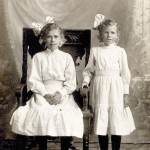 These days, with most towns having multiple schools, our school days are often taken for granted, and even viewed…by many students and boring, grueling, and basically something to get through and over with, so they can move on to real life. But, schooling in the old west, and even into the mid 1900’s wasn’t always such an easy thing to accomplish. As our nation grew, and people spread out across its vastness, schools were one thing in short supply. Many parents had to home school their children, which is becoming more of a luxury item these days, because with home schooling, comes the loss of one income, and many people can’t or don’t want to make it on one income.
These days, with most towns having multiple schools, our school days are often taken for granted, and even viewed…by many students and boring, grueling, and basically something to get through and over with, so they can move on to real life. But, schooling in the old west, and even into the mid 1900’s wasn’t always such an easy thing to accomplish. As our nation grew, and people spread out across its vastness, schools were one thing in short supply. Many parents had to home school their children, which is becoming more of a luxury item these days, because with home schooling, comes the loss of one income, and many people can’t or don’t want to make it on one income.
When my great grandparents, Carl and Henriette Schumacher moved their family from Minnesota to North Dakota, they were quite a way from the school, but they saw the importance of educating their children. The family spoke German at home, and when the older children started school, the teachers made fun of their lack of the knowledge of the English language. Henriette immediately set out to change that. German would no longer be spoken in the home. The whole family would make the switch to English. The distance to school was a big problem, but Carl made sure that his children were there…no matter what.
That worked well for the older children, but at that time in history, many children didn’t go to school after the 6th grade, and some quit sooner. So, when Bertha and Elsa, the youngest children were in school, a new problem presented itself. The school was nearer to them now, but often there were not enough students to warrant keeping it open, thus their education became hap-hazard. That is not to say that they did not get their education, because they did, and even went on to college. Theirs was just a little bit different than their older siblings.
Bertha tells of going to school in the small school, with very few students, but she also talks of the year they were home schooled but their oldest sister, my future grandmother, Anna. She talks of the time that they spent in a small house in Lisbon, with Mina staying with them so they could go to school. And of course, there were the times they went by horse and buggy into school. Those were hard times, and I have to wonder how the girls kept up with the other students, and were able to continue on to the high school in Lisbon. It’s not that I wondered about my grandmother’s ability to teach, but with little or no regulation, how did the school in Lisbon know anything about their prior education.
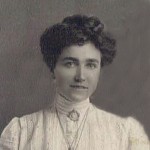
I suppose they had to take some kind of test or visit with the teacher for a time so they could determine where they were in their education, and therefore could be placed in one grade or another. I know that often in homeschooling situations today, the students are ahead of their age group, but I still wonder if that was the case then, because their materials were few and there was really no clear way to know if the teacher was keeping up with other classes for their pupils’ age groups. Those must have been hard and confusing times for Bertha and Elsa. Nevertheless, they both finished school, like their older siblings, and went on to college, but their education was definitely at The School of Hap-Hazard.
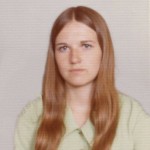 Most of us have gone through a time in our lives when we hated our name. We wonder why our parents would have considered such an awful name for their child. It doesn’t matter what the name is either. It could be the cutest name on earth, and it’s owner would probably at one point or another, hate it. As an early teenager, I thought my name was too strange. I suppose I was at an age where it seemed important to blend in with the crowd, and an unusual name simply didn’t do that for me. I often thought I might like to be named Carrie, and yet, I never took that or any other nickname. I guess deep inside, I didn’t really dislike my name at all, but was rather at a self conscious age, and the name seemed as good a scapegoat as any. These days, I love my name, and I wouldn’t want any other.
Most of us have gone through a time in our lives when we hated our name. We wonder why our parents would have considered such an awful name for their child. It doesn’t matter what the name is either. It could be the cutest name on earth, and it’s owner would probably at one point or another, hate it. As an early teenager, I thought my name was too strange. I suppose I was at an age where it seemed important to blend in with the crowd, and an unusual name simply didn’t do that for me. I often thought I might like to be named Carrie, and yet, I never took that or any other nickname. I guess deep inside, I didn’t really dislike my name at all, but was rather at a self conscious age, and the name seemed as good a scapegoat as any. These days, I love my name, and I wouldn’t want any other.
My mom had told me that she was ok with her first name, Collene, even though most people mispronounced it and called her Colleen, which is not her name at all. Collene is pronounced with a short o sound, while Colleen is pronounce with a long o sound. This was not the name she disliked, however. Mom disliked her middle name, which is Ione. I never could understand why that name bothered her at all, because she didn’t have to tell anyone what it was, so what was the problem. Then again, I suppose that if Ione had been my middle name, I might have felt the same way in those awkward teenaged years. Mom eventually got over her dislike of her middle name, I guess, because she doesn’t mention it anymore. 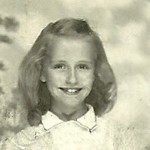 People usually grow up and decide that those little things don’t really make that much difference anyway.
People usually grow up and decide that those little things don’t really make that much difference anyway.
My Great Aunt Mina Schumacher, however hated her name all of her life. She was baptized Minna Albertina Schumacher, and I guess Albertina didn’t bother her, or maybe it was simply that she told no one what her middle name was, if it did. At that time, like often happens today, people added “ie” to the end of a child’s name and so, Minna became Minnie. Most people thought it was a very pretty name for a little girl, but Mina did not agree. Maybe it made her feel like she was always considered a little girl, and she wanted to be grown up. Whatever the reason, she hated it, and when she became an accountant, she decided that the name Minnie had to go. Her solution was to drop the “nie” from her nickname, and go, simply by Min. Her sisters Bertha and Elsa, and most of Mina’s friends decided that name suited her better than any other, and for them, she was Min from that time on. Mina’s husband, John Spare, who was going by his middle name, Clark when they met, liked the name Minnie, and called her that for some time, but gave in to her need for a more grown up name when they married. Later, when John became head of the Engineering Department of the State Highway Department in Bismarck, North Dakota, the need for a more dignified name arose, so Mina dropped one “n” from her baptismal name and became Mina.
According to Mina’s sister, my Great Aunt Bertha, children should simply be called “Hey” until they are old 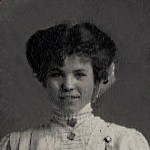 enough to decide on a name they really like. I suppose that would be a possibility, and I’m sure she was just joking, but it could also be very confusing, since there could be entire classrooms of children going by the same name. Just think how confusing it would be as the teacher called on her students. I suppose one could say that using the last name would solve all that, but then again, since classrooms back then had all the grades in the same class, including brothers and sisters, that would still be problematic. Having three Hey Smiths in the class would be very confusing. I guess that is why it is your parent’s choice as to your name, whether you hate your name or not.
enough to decide on a name they really like. I suppose that would be a possibility, and I’m sure she was just joking, but it could also be very confusing, since there could be entire classrooms of children going by the same name. Just think how confusing it would be as the teacher called on her students. I suppose one could say that using the last name would solve all that, but then again, since classrooms back then had all the grades in the same class, including brothers and sisters, that would still be problematic. Having three Hey Smiths in the class would be very confusing. I guess that is why it is your parent’s choice as to your name, whether you hate your name or not.
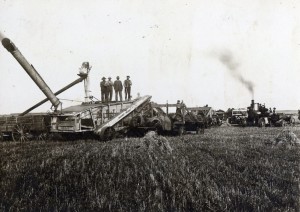 Farm work in years gone by, was a much harder job than it is these days, but with the invention of machinery, things got easier. Still, most people couldn’t afford to own those machines in the early years, so they either did the work by hand, or hired the threshers to come and do it. Soon, most farmers were hiring the threshers to come. It was a lucrative business for someone who had enough money to buy a machine…or better yet, several. I know that those members of my family, who were farmers, did hire the threshers, or else, they had enough money to buy their own machines, but I have to think that most people in those early years did not think the machine was a good value, if a man was going to just use it on their own farm, so the work was mostly hired out.
Farm work in years gone by, was a much harder job than it is these days, but with the invention of machinery, things got easier. Still, most people couldn’t afford to own those machines in the early years, so they either did the work by hand, or hired the threshers to come and do it. Soon, most farmers were hiring the threshers to come. It was a lucrative business for someone who had enough money to buy a machine…or better yet, several. I know that those members of my family, who were farmers, did hire the threshers, or else, they had enough money to buy their own machines, but I have to think that most people in those early years did not think the machine was a good value, if a man was going to just use it on their own farm, so the work was mostly hired out.
When the threshers were scheduled to come to your farm, it was a big day. The women would get up early and start cooking for the men, who would be very hungry by lunch time. 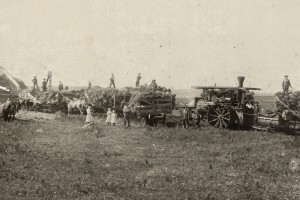 This was heavy work, even with the help of the machinery. Nevertheless, everyone was excited when the threshers came…from the adults to the little kids. I’m sure that being able to watch the big machines working was a novel thing in those early years, and nobody wanted to miss out. Not only that, but everyone wanted to get their picture taken with the workers too, so that they could say they had been there when they were working. It was almost like having a celebrity visit your house, I suppose. It is a day like no other in the year. Everyone wants to be in on all the excitement, and it’s hard to keep the little kids out of the way. Nevertheless, they had to stay out of the way, because the huge machines were also dangerous and could easily kill a small child.
This was heavy work, even with the help of the machinery. Nevertheless, everyone was excited when the threshers came…from the adults to the little kids. I’m sure that being able to watch the big machines working was a novel thing in those early years, and nobody wanted to miss out. Not only that, but everyone wanted to get their picture taken with the workers too, so that they could say they had been there when they were working. It was almost like having a celebrity visit your house, I suppose. It is a day like no other in the year. Everyone wants to be in on all the excitement, and it’s hard to keep the little kids out of the way. Nevertheless, they had to stay out of the way, because the huge machines were also dangerous and could easily kill a small child.
With the excitement, however, comes hard work. When the threshers are done. The grain had to be bagged for storage or sale, and the straw stacked for use in the barns. Nevertheless, it took a lot less workers to harvest the crops, and many farm laborers were not happy about that, because they faced the loss of their jobs. I suppose that with every bit of progress 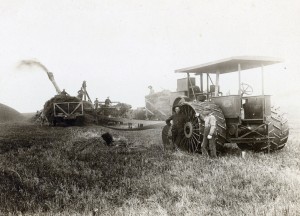 designed to make our lives easier, comes the possibility of job loss. Every time a machine takes over the hard labor, a worker becomes unnecessary. People have to adapt and change, educating themselves to run the equipment so they can move into a job that takes more skill, and thus creates job security. I know that for the farmer, the machines were the best thing to come along. The wages they didn’t have to pay out to the laborers added up to pure profit for them, even with the cost of the threshers. It was a new era, and things would never be the same again.
designed to make our lives easier, comes the possibility of job loss. Every time a machine takes over the hard labor, a worker becomes unnecessary. People have to adapt and change, educating themselves to run the equipment so they can move into a job that takes more skill, and thus creates job security. I know that for the farmer, the machines were the best thing to come along. The wages they didn’t have to pay out to the laborers added up to pure profit for them, even with the cost of the threshers. It was a new era, and things would never be the same again.
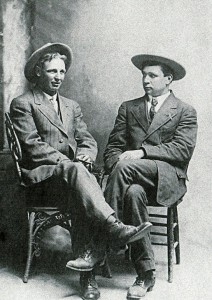 I have noticed in the family history books that my Uncle Bill Spencer put together over the years, that people in the family, or maybe that era, would sometimes just pick up and go visit a different branch of the family…often without much or any advance notice of their impending arrival. I suppose that sometimes they just got excited about finding out about a different branch of the family, and decided to go check it out for themselves. Being a bit shy around strangers, family or otherwise, I find this type of visit to be very strange indeed. What do you say to those people after the initial, “Hello, You don’t know me, but I am your relative from Wyoming.” I would simply have no idea. That is probably why most people who do go to visit relatives they don’t know or don’t know well, take someone else with them…to help carry the conversation. I can’t imagine going alone, and yet that seems to be the norm for some people.
I have noticed in the family history books that my Uncle Bill Spencer put together over the years, that people in the family, or maybe that era, would sometimes just pick up and go visit a different branch of the family…often without much or any advance notice of their impending arrival. I suppose that sometimes they just got excited about finding out about a different branch of the family, and decided to go check it out for themselves. Being a bit shy around strangers, family or otherwise, I find this type of visit to be very strange indeed. What do you say to those people after the initial, “Hello, You don’t know me, but I am your relative from Wyoming.” I would simply have no idea. That is probably why most people who do go to visit relatives they don’t know or don’t know well, take someone else with them…to help carry the conversation. I can’t imagine going alone, and yet that seems to be the norm for some people.
My grandfather did just that when he went out to visit his Aunt Tessie, as did his brother, my Great Uncle Clifford. Oddly, both of them just dropped in on Aunt Tessie!! I don’t know if Uncle Clifford just liked what he heard about Aunt Tessie from his brother, my Grandpa Allen Luther Spencer, or if he was curious about her and her family too, or if he even knew of the prior visit by a member of his family, but he went, and he went alone. I also have to wonder what Aunt Tessie thought of the whole thing…like, “What is it about me that makes these people keep just showing up here?” It appears to me, as it did to my Uncle Bill, that my cousin Cornelius Davis, who was Aunt Tessie’s son, found his cousin a little strange, or maybe the entire visit was just strange to him. It’s possible that he was wondering why these relatives just popped in like they did too, without any advance notice…or maybe he was wondering just how long this guy planned to stay.
Bob and I have gone many times to visit his family in Forsyth, Montana, but we always told them that we were coming, and our stay was just a week. I guess, in days gone by, when it takes a long time to get somewhere, it didn’t make sense just to stay a week, because it probably took several days driving out, so if all you had was a week, you would have to turn around and leave again. Still, I can’t imagine going for a visit without letting anyone know. Of course, the phone was not widely used in those days, so it would mean a telegraph, but it seems that many people just went and didn’t worry about it. Whatever the case may be, my cousin Cornealius seemed to think it was rather a strange visit indeed.
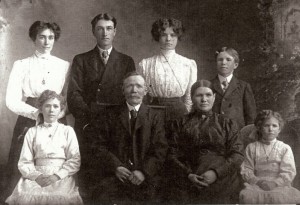 It’s strange that our minds, even as small children can remember the things that most impressed us. Even as young as 3, or maybe even younger, those memories so clearly imprint themselves on our mind that we can see the event as if we were experiencing it still. Sometimes that memory is scary and we wish we could forget, such as the time I was tripped by a woman trying to get off of the escalator that we were on. I clearly remember falling, my dress being torn, and my chin and elbow being cut. Escalators bother me to this day. Other memories, like the first time we got to stay in a motel bring a smile to my face.
It’s strange that our minds, even as small children can remember the things that most impressed us. Even as young as 3, or maybe even younger, those memories so clearly imprint themselves on our mind that we can see the event as if we were experiencing it still. Sometimes that memory is scary and we wish we could forget, such as the time I was tripped by a woman trying to get off of the escalator that we were on. I clearly remember falling, my dress being torn, and my chin and elbow being cut. Escalators bother me to this day. Other memories, like the first time we got to stay in a motel bring a smile to my face.
I’m sure that is exactly how my Great Aunt Bertie Schumacher felt when she remembered the fall days on the farm, after the wheat had been harvested, and the flocks of ducks and geese would begin their migration south. She remembers that the wheat fields seemed to be covered  with a thick cloud, that was in fact the flocks of ducks and geese. Then the fields seemed to be alive as they went about looking for food as the evening neared. She recalls how her older brother, Albert would go out to the wheat fields and return with twenty birds in an hour. While Fred, Bertie, and Elsa watched with their mouths watering, Anna and Mina had to clean the birds, and even though they liked the end result, the cleaning was a lot of work, and they grumbled through every second of it.
with a thick cloud, that was in fact the flocks of ducks and geese. Then the fields seemed to be alive as they went about looking for food as the evening neared. She recalls how her older brother, Albert would go out to the wheat fields and return with twenty birds in an hour. While Fred, Bertie, and Elsa watched with their mouths watering, Anna and Mina had to clean the birds, and even though they liked the end result, the cleaning was a lot of work, and they grumbled through every second of it.
Years later the family had a smoke house, and the meat that came from there was heavenly. Great Aunt Bertie said she could still taste that meat, while feeling quite sad that she had gone years without it by then. One of her fondest memories of her mother was one of sneaking out to the smoke house with a sharp knife and cutting off a bit of the meat whenever they needed a snack in the middle of the day. And the best thing is that it was allowed in their home, and not considered an offence in need of punishment.

So much of life is commonplace, and would maybe even be considered boring, but in every life there are moments that stand out…that, are labeled in our memory files as special and very important, even if, to other people, they would not seem so. It is the privilege of each person’s mind to pick the memories that it finds the most special and the most important…the sweetest memories. Then they are locked away, so they can be opened up another day, when something we see, hear, taste, smell, or touch triggers that particular file to reopen and pour out that sweet memory that has been tucked away there, so that we can experience it once again in our mind.
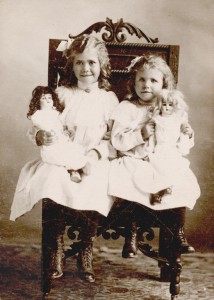 It would be hard for most of us to imagine a world where we got to go to town only once a year, and yet that was the way of things back when my Great Aunt Bertie Schumacher was a little girl. The Schumacher family moved from Minnesota to a place 8 miles from Lisbon, North Dakota, and the school house was 3 miles from where they lived. Bob and I, in our many evening walks have walked 8 miles at a time, but not in the winter, and since that walk takes us 2 hours, I can’t say that it would be feasible as a way to go to town for groceries, because then there is that walk back loaded down with groceries. Just the thought of 4 hours of walking in the winter cold is enough to make me cringe.
It would be hard for most of us to imagine a world where we got to go to town only once a year, and yet that was the way of things back when my Great Aunt Bertie Schumacher was a little girl. The Schumacher family moved from Minnesota to a place 8 miles from Lisbon, North Dakota, and the school house was 3 miles from where they lived. Bob and I, in our many evening walks have walked 8 miles at a time, but not in the winter, and since that walk takes us 2 hours, I can’t say that it would be feasible as a way to go to town for groceries, because then there is that walk back loaded down with groceries. Just the thought of 4 hours of walking in the winter cold is enough to make me cringe.
Nevertheless, the children needed to be in school, so Great Grandpa Carl Schumacher got up early every morning, to get the horses out and break a trail, then hook up to the sleigh for the 3 mile drive in to the school with his older children, Anna (my grandmother), Albert, and Mina. Aunt Bertie remarks in her journal, that she and Elsa were very glad that they could stay home with their mother. The sleigh was nothing like the more romantic New England cutters we all think about, but was rather a grain wagon box placed on two heavy runners pulled by their sturdiest horses because of all the deep snow the area got. Great Grandma Henriette would bring the older 3 children out to the wagon, and place bricks she had heated by their feet. Then she would wrap them in blankets that even covered their faces to protect them from the bitter cold. In all the time the children went to that school, they were there everyday, unless they were sick. It was by far the best attendance record in the school, and the Schumacher family lived the furthest away from the school. When Aunt Bertie went to school, a place she was not very fond of, she had to force herself to do what she needed to. It was at this time that she met the only teacher that would remain in her memory for the rest of her life. She was beautiful, and well dressed, but it was her graciousness and her love for children that made her the best teacher little Bertie would ever have.
Not long after Bertie started school, the family moved closer to Lisbon, and the school was only a mile away, and much to Bertie’s delight, it had an indoor bathroom. No more running outside to the outhouse in the middle of a freezing cold day and then running back inside in 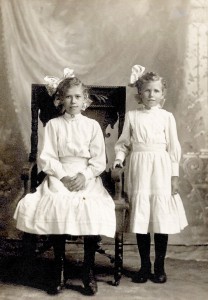 the cold again. Bertie felt like she was attending school in a palace, I’m sure. One day, when her mother had to drive the long distance into town on a very cold winter day, she decided to leave little 4 year old Elsa at the school with Bertie and their brother, Fred for the day. Elsa had never been away from her mother before, and they were very close, so she proceeded to cry. The older children could not console her, and finally a teacher came and took Elsa under her wing, calming her and allowing her and her siblings the peace of knowing that everything was going to be alright. Bertie recalls how it is funny that the memories that really stay in your memory are the ones where someone showed such love and kindness that the memory of it lingered on for years to come. What a lovely way to be remembered. That is something I think I should like to be remembered as. Loving and kind enough that the memory of my acts of kindness and love stay in the memories of those whose lives I might have touched.
the cold again. Bertie felt like she was attending school in a palace, I’m sure. One day, when her mother had to drive the long distance into town on a very cold winter day, she decided to leave little 4 year old Elsa at the school with Bertie and their brother, Fred for the day. Elsa had never been away from her mother before, and they were very close, so she proceeded to cry. The older children could not console her, and finally a teacher came and took Elsa under her wing, calming her and allowing her and her siblings the peace of knowing that everything was going to be alright. Bertie recalls how it is funny that the memories that really stay in your memory are the ones where someone showed such love and kindness that the memory of it lingered on for years to come. What a lovely way to be remembered. That is something I think I should like to be remembered as. Loving and kind enough that the memory of my acts of kindness and love stay in the memories of those whose lives I might have touched.
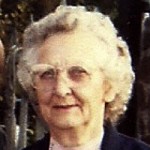 As I was looking through some old pictures, I came across one of a house. It was old, with it’s windows and doors boarded up. At first I thought that it was sad that so many houses around our country are left to fall apart, right in a town where people are using the homes all around it. I couldn’t figure out why this house had some significance, when so many others don’t. Then I looked at the back of the picture and I was surprised at what I found. First of all, so many of the pictures I have looked at, were not written on at all, leaving so much of the family history to the imagination…frustrating to say the least, and I know too that I have been guilty of that myself. We think that we will know the people in the picture, and we will, but what of the people in years to come…our children and grandchildren or even, great grandchildren…what will they know of the people or places in the picture.
As I was looking through some old pictures, I came across one of a house. It was old, with it’s windows and doors boarded up. At first I thought that it was sad that so many houses around our country are left to fall apart, right in a town where people are using the homes all around it. I couldn’t figure out why this house had some significance, when so many others don’t. Then I looked at the back of the picture and I was surprised at what I found. First of all, so many of the pictures I have looked at, were not written on at all, leaving so much of the family history to the imagination…frustrating to say the least, and I know too that I have been guilty of that myself. We think that we will know the people in the picture, and we will, but what of the people in years to come…our children and grandchildren or even, great grandchildren…what will they know of the people or places in the picture.
So, what of the house in the picture I found…well, it was the house that Bob’s grandmother, Vina Nona Leary Schulenberg Hein was born in, 105 years ago today. It’s strange to think that you are looking at a house that was the specific location of a specific event over a century earlier, but that is exactly the case. Most births took place in the home back then, and this one was no different, in fact, it was probably completely routine…to them. To most of us today, that seems incredible, even though home births are making a comeback.
Grandma Hein’s birthday was always easy for me to remember, because it came on Groundhog’s Day. I’m sure that was always something her whole family thought was a cool thing too. Having a birthday on a special day or holiday can be fun, with the possible exception of Christmas. I have heard that a Christmas birthday, or even close to it, can be a real bummer with the whole gift thing and all, but any other special day is a cool thing. Grandma’s birthday being on Groundhogs Day, marked the day of either the promise of an early spring or 6 more weeks of a dreary winter. I don’t know, that one might depend on the 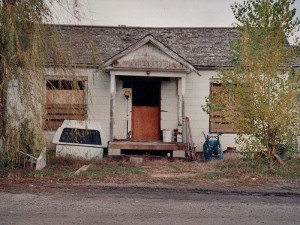 outcome, as to whether it was a cool birthday or not. Nevertheless, being able to look at the very house that was aflutter with activity on this Groundhog’s Day 105 years ago is a cool thing to me. I have to wonder what the walls of this old house could tell us of that day. Quite a bit I expect. It’s a bit sad to think that no little children run and play in it’s rooms, no wonderful smells fill it’s rooms, no family enjoys the warmth of it’s rooms, but rather it has become a sad empty structure left to fall apart. Still, it was an important place in it’s day…Grandma’s day of birth 105 years ago today. Happy birthday Grandma!! We love and miss you very much.
outcome, as to whether it was a cool birthday or not. Nevertheless, being able to look at the very house that was aflutter with activity on this Groundhog’s Day 105 years ago is a cool thing to me. I have to wonder what the walls of this old house could tell us of that day. Quite a bit I expect. It’s a bit sad to think that no little children run and play in it’s rooms, no wonderful smells fill it’s rooms, no family enjoys the warmth of it’s rooms, but rather it has become a sad empty structure left to fall apart. Still, it was an important place in it’s day…Grandma’s day of birth 105 years ago today. Happy birthday Grandma!! We love and miss you very much.
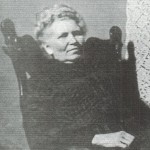 My Great Great Aunt Ida Spencer Brown Nass, married Andrew Alfred Brown on October 1, 1872. They had two sons, Elmer Ellsworth and Andrew Alfred. It is unknown what happened to Ida’s first husband, but she later married Sjur Johannesson Nass, who went by Samuel, and they had two daughters, Ellen and Ethel.
My Great Great Aunt Ida Spencer Brown Nass, married Andrew Alfred Brown on October 1, 1872. They had two sons, Elmer Ellsworth and Andrew Alfred. It is unknown what happened to Ida’s first husband, but she later married Sjur Johannesson Nass, who went by Samuel, and they had two daughters, Ellen and Ethel.
Ida and Andrew’s son Andrew Alfred, who usually went by A.A. Brown, married a woman names Emma Caroline Haessler. Their marriage was filled with love, and blessed with ten children, Gertrude Flora, Alwyn A, Emma Henrietta, John Henry “Johnie”, Bessie, Warren Winston, Elizabeth Ida, Edward Spencer, James Robert, and Fredrick Valden. While their lives were happy, they were not long. Emma passed away on October 31, 1918, leaving Andrew to raise their seven children…a difficult task with small families, but much harder for a man with seven children. Andrew was doing quite well with the task, even though his oldest daughter, Gertrude, who had most likely been a big help, was married on April 20, 1920, leaving him with one less helping hand around the house. Their son Alwyn had preceded his mother in death on June 10, 1918, as had Johnie on September 12, 1905 at 3 years of age, and Bessie on September 10, 1905 at 3 months of age.
On January 29, 1921, tragedy would again strike the family, when Andrew was killed in The Great Olympic Blowdown. The storm, which was one of the worst in Washington state 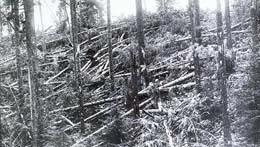 history, came in off the coast at around 8:00 am on January 29, bringing with it, hurricane force winds estimated at 125 to 150 mph. The Forest Service estimated the loss of timber at several billion board feet. The loss of life was one, Andrew A Brown, who was an engineer working at the Anderson-Middleton Lumber Mill in Aberdeen. He was killed instantly when a sudden gust blew down a smokestack pinning him against a broken steam pipe and scalding him to death.
history, came in off the coast at around 8:00 am on January 29, bringing with it, hurricane force winds estimated at 125 to 150 mph. The Forest Service estimated the loss of timber at several billion board feet. The loss of life was one, Andrew A Brown, who was an engineer working at the Anderson-Middleton Lumber Mill in Aberdeen. He was killed instantly when a sudden gust blew down a smokestack pinning him against a broken steam pipe and scalding him to death.
Once again, a grieving Gertrude, who had married Patrick Mint House, stepped in, taking the remaining six children into their home and raising them as their own. Emma was 21 years old by then, so I don’t know if she lived with her sister or not, but the rest of the children ranged in ages from 4 years to 14 years. The littlest ones would most likely not even remember their parents very clearly in the coming years. Their parents hadn’t shared memories of their childhood even with their eldest daughter, Gertrude, so the memories the younger children would have would only be what little bits and pieces she could tell them of her childhood years with their parents. I have to commend Gertrude and Patrick for their heroic and selfless act of taking in her siblings. I can only imagine how hard that must have been for them. In looking through the genealogy records, I can’t find any evidence of Gertrude and Patrick having any children of their own. I don’t know 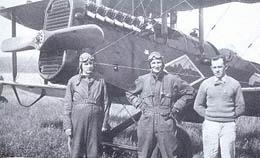 if that was because they were unable to have children or that they had a ready made family. Either way, I find that very sad, because I think they must have been wonderful, loving parents. I imagine that it was an enormous job to take on six children…especially when one is only 23 years old herself. Still, they were family and she loved them. She could not bear to have them go to an orphanage, so she and her husband did what they had to do, and raised her siblings in a happy, loving home…an act of kindness the children never forgot.
if that was because they were unable to have children or that they had a ready made family. Either way, I find that very sad, because I think they must have been wonderful, loving parents. I imagine that it was an enormous job to take on six children…especially when one is only 23 years old herself. Still, they were family and she loved them. She could not bear to have them go to an orphanage, so she and her husband did what they had to do, and raised her siblings in a happy, loving home…an act of kindness the children never forgot.

